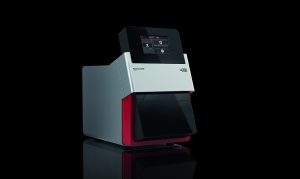 Assessment of thermal stability parameters of biologics is an integral part of biopharmaceutical research. The ever-growing number of biologics in development pipelines worldwide demands rapid and precise methods to quickly screen large sets of conditions in an easy and straight-forward manner.
Assessment of thermal stability parameters of biologics is an integral part of biopharmaceutical research. The ever-growing number of biologics in development pipelines worldwide demands rapid and precise methods to quickly screen large sets of conditions in an easy and straight-forward manner.
In a recent study, we compared two methods for detection of thermal unfolding transition temperatures (Tm) of a therapeutic monoclonal antibody (MAb): nanoDSF, which analyzes changes in the fluorescence emission properties of proteins, and differential scanning calorimetry (µDSC), which detects changes in the heat capacity of a protein solution upon unfolding. Both nanoDSF and µDSC provide precise and consistent data. But nanoDSF also overcomes several limitations of µDSC (e.g., low throughput and high sample consumption) and thus represents the ideal technology for rapid and precise thermal stability screening in biopharmaceutical development.

